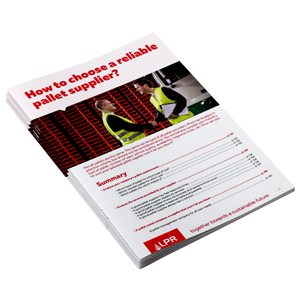In the realm of supply chain management, transport packaging, including pallets, assumes a critical role in facilitating seamless logistics operations and ensuring that goods reach their destinations punctually and in optimal condition.
These are the often-unseen links that ensure cohesion among the various phases of distribution, warehousing, and delivery.
Throughout these different supply chain stages, logistics providers, such as 3PL (Third-Party Logistics) and 4PL (Fourth-Party Logistics) companies, can step in as strategic partners for companies aiming to enhance their supply chain efficiency.
In this article, we will explore the distinctions between 3PL and 4PL logistics companies, along with the factors to consider before outsourcing your pallet management to one.
Menu:
1 | 3PL and 4PL companies: what are the differences?
2 | Assess your palletisation-related supply chain challenges
3 | 3PL or 4PL company: the advantages and disadvantages
1. 3PL and 4PL companies: what are the differences?
Logistics service providers occupy a pivotal role in overseeing the complex supply chains prevalent in today’s industries.
We can categorise logistics firms based on the spectrum of services they provide, distinguishing between 'Third-Party Logistics' (3PL) companies and 'Fourth-Party Logistics' (4PL) companies.
The primary distinction between these two types of companies hinges on their degree of engagement and accountability in managing the logistics operations for their customers.
1.1. 3PL companies
3PL companies function as intermediaries between a company's supply chain and its ultimate point of sale, providing specialised services such as transportation, warehousing, and distribution.
When a company opts for a 3PL logistics provider, it gains access to the industry knowledge and resources of the 3PL firm for specific logistics functions while still maintaining managerial control.
For instance, the company remains responsible for placing orders with its suppliers for raw materials required in its product manufacturing process, but the 3PL provider assumes responsibility for storing and delivering the finished products.
1.2. 4PL companies
In contrast, 4PL companies adopt a comprehensive and strategic perspective. They orchestrate the diverse logistics services of a company by collaborating with multiple service providers, thereby optimising the entirety of the client company's supply chain.
In contrast to 3PLs, 4PLs typically do not possess tangible assets like warehouses or vehicles; rather, they generate value through the coordination of various third-party logistics entities.
-----------
In summary, 3PL firms offer specialised expertise for the outsourcing of specific operations, while 4PL companies assume the strategic oversight of the entire supply chain.
These logistics service providers may also extend their support to address pallet-related challenges.
Therefore, in determining which of these two solutions best suits your business, it is imperative to initially assess your company's unique pallet management requirements.
2. Assess your palletisation-related supply chain challenges
There is no universally superior option for pallet management, as the optimal solution varies depending on the constraints and particularities of each industry.
To determine the most suitable solution for your requirements, you should start by evaluating all the supply chain challenges associated with palletisation. This assessment will facilitate the selection of the most effective logistics provider.
Here are some sample questions to consider to be able to make an informed decision:
2.1. Are you handling systems automated?
Prior to entering a partnership, it is advisable to inquire about the pallet suppliers of the prospective service provider to ensure that they offer pallets compatible with your automated handling systems.
At LPR - La Palette Rouge, we assist 3PL and 4PL companies by furnishing them with high-quality pallets specifically tailored for automated handling and warehousing systems.
2.2. Are your goods all transported on the same type of pallet (format, size, etc.)?
Depending on the nature of your goods, you might require transport pallets in varying sizes and configurations. Therefore, it's essential to select a 3PL or 4PL provider that collaborates with a supplier offering a diverse range of pallets.
As an illustration, LPR - La Palette Rouge offers 3PL and 4PL companies a variety of pallet formats tailored to distinct purposes:
-
UK100 handling pallets: this is the standardised pallet format most used in the United Kingdom and the USA.
-
European pallets (800 x 1200 mm): A little smaller than the standard UK format, this is the standardised format in the European Union.
-
The Dusseldorf half-pallets (600x800mm)
-
Display quarter pallets (400 x 600 mm)
Read more on this topic here: 6 criteria for choosing the right handling pallet
2.3. Do you have difficulty recovering and repairing your pallets?
Currently, it is essential to prioritise reusable and recyclable transport packaging that can undergo multiple cycles, thereby contributing to the reduction of your supply chain's carbon footprint.
However, unlike disposable packaging, this reusable packaging requires the integration of collection and maintenance operations within your supply chain. Once these pallets reach the end of the chain, they need to be retrieved, inspected, cleaned, refurbished, and recycled when necessary.
To ensure an effective maintenance process, it's essential to establish a well-coordinated effort among the various stakeholders in your supply chain.
To optimise your supply chain's performance and avoid unnecessary expenses related to pallet loss, you have the option to outsource this task by entrusting it to a 3PL or 4PL company.
At LPR, our pallet rental and management service is built around the principles of the circular economy and supply chain optimisation. We handle the entire process, including delivery, collection, and maintenance of the pallets, for the 3PL and 4PL companies we partner with.
----------
In addition to the mentioned factors, it's crucial to broaden your perspective and examine all scenarios in which pallets are utilised. This comprehensive assessment will help you identify the specific criteria that your chosen 3PL or 4PL logistics provider must adhere to or enhance based on their expertise.
By conducting this thorough analysis, you can make an informed decision that caters to your business's distinct requirements and enhances the overall efficiency of your supply chain.

3. 3PL or 4PL: the advantages and disadvantages
Having gained a clear understanding of your pallet management requirements, you can now evaluate the suitability of 3PL and 4PL logistics companies based on your specific criteria.
Let's delve into the advantages and limitations of both:
3.1. When you choose to delegate your pallet managament to a 3PL
The advantages of a 3PL logistics company
-
A specialised service provider: 3PLs possess specialised expertise in various aspects of logistics, providing access to professional skills without the need for significant internal investments.
-
Cost reductions: Leveraging their extensive networks of service providers throughout the entire supply chain, 3PLs can capitalise on economies of scale and deliver high-quality services to your business for less cost.
The disadvantages of a 3PL logistics company
-
Loss of control: Outsourcing logistics operations to a 3PL company means relinquishing a degree of control over these processes. Your dependency shifts to the efficiency and quality of services offered by the service provider, which can be a concern if their performance falls short of your expectations.
-
Complexity in communication: Ineffective communication between your business and the 3PL company can result in issues such as delays, order inaccuracies, or inventory shortages.
Therefore, it is essential to choose your partner carefully so that the collaboration is fruitful, and your supply chain is efficient.
3.2. When you choose to delegate your pallet managament to a 4PL
The advantages of a 4PL logistics company
-
Strategic dimension: A 4PL provider takes a comprehensive approach to managing your supply chain by considering all its components. This means entrusting them with overall and strategic resource management.
-
Management expertise: A 4PL company will offer you in-depth expertise in supply chain management, contributing to the continuous improvement of your processes and operational efficiency. It will collaborate and coordinate various logistics players within its network to achieve these goals.
-
Increased visibility: The majority of 4PLs employ advanced technologies to maintain real-time visibility across all phases of your supply chain. The immediacy of this information enables them to make more informed and strategic decisions.
The disadvantages of a 4PL logistics company
-
Strong external dependence: By delegating strategic management to a 4PL, your company becomes more reliant on a third party for significant decisions, potentially heightening the vulnerability of your supply chain.
-
Initial financial investment: Incorporating advanced technologies and management solutions may involve a substantial initial investment from your company, along with ongoing expenses.
-
Complex cooperation: Managing and coordinating multiple suppliers and service providers can be complicated and demands continuous communication and oversight to ensure it works effectively. It's essential to ensure that your logistics provider and its various partners have open communication channels with your production lines.
Conclusion
In conclusion, 3PL companies provide specialised expertise in specific logistics areas while allowing your business to maintain some supply chain control.
On the other hand, 4PL companies take a more holistic and strategic approach, coordinating your entire supply chain, offering increased visibility and management expertise but making your business more reliant on a third party.
The choice between a 3PL and 4PL company should depend on your specific pallet management needs. It's crucial to start by assessing your supply chain issues related to pallets to make an informed decision. Ultimately, the best option will align with your priorities and your business's unique characteristics, optimising the overall performance of your supply chain.
Our teams are available to assist you and ensure a smooth transition towards making the change. Contact us today!



